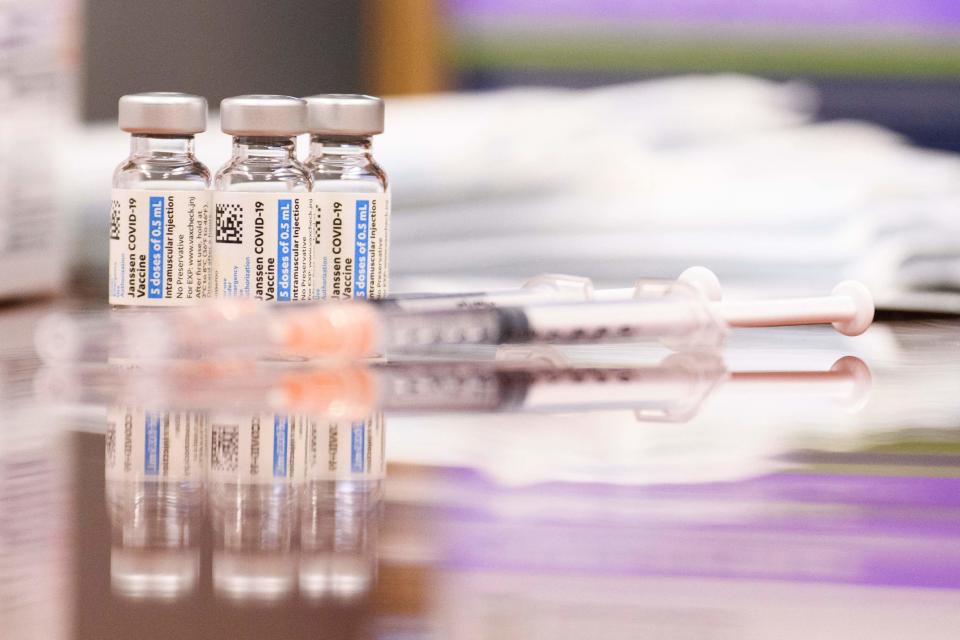'Break up' with J&J? Some are ready to try Pfizer or Moderna as FDA panel considers boosters.
A federal advisory committee on Thursday supported booster doses for certain Americans who received the Moderna COVID-19 vaccine. On Friday, that same committee will determine if a second shot is needed for those who received the Johnson & Johnson vaccine.
While the panel voted with limited data to support the Moderna booster for those 65 and older and younger adults at higher risk because of their health or employment, it's unclear if the J&J booster, which has been studied even less, will receive the same support.
Information posted by the Food and Drug Administration on Wednesday showed about 8,000 people were studied after receiving a second dose of J&J’s vaccine two months after the first, but only 17 were tracked after six months. That may not be enough data, experts say, to base a decision.
"The J&J data are even more modest than the Moderna data," said Dr. William Schaffner, an infectious disease physician at the Vanderbilt University School of Medicine in Nashville, Tennessee. "If they decide the data aren’t sufficient, they can tell J&J to go and do a larger study and then come back."
How does COVID-19 affect me? Don’t miss an update with the Coronavirus Watch newsletter
Other experts anticipate the FDA panel – called the Vaccines and Related Biological Products Advisory Committee – will support a second J&J shot.
"I would be shocked if they didn’t approve the J&J booster, it’s the weakest vaccine of the three,” said Dr. Robert Murphy, executive director of the Institute for Global Health at Northwestern University Feinberg School of Medicine.
Last month, the committee supported boosters for people who received the Pfizer-BioNTech vaccine and are either 65 or older, under 65 with certain health conditions, or people who are at high risk for contracting COVID-19 because of their work.
No matter what the advisory committee decides about the J&J vaccine, people who got the "one-and-done" jab don’t necessarily want another dose of the company’s vaccine.
“I’m going to break up with J&J,” said Jill Oliver, 56, a resident of Boulder, Colorado. She was hesitant to get the company's shot in March. Although she wanted to wait for a Moderna or Pfizer vaccine, she listened to public health leaders and got the first vaccine available to her.
“I thought I was doing the right thing,” Oliver said. “Now, I’m walking around with my mask on and not feeling protected when I’m the one who stepped up to the plate and did what I was told.”
A few weeks after the J&J vaccine was authorized for emergency use, the FDA and the Centers for Disease Control and Prevention in April recommended a pause to investigate reports of blood clots associated with the vaccine. The agencies eventually lifted the pause after determining the blood clots were rare and the benefits of the shot far outweighed the possible risks.
For many J&J vaccine recipients, it was the start of a convoluted journey marked by mixed data and confusing messaging.

Studies have shown that while it remains highly effective at preventing severe illness and death, the J&J vaccine is less effective at preventing symptomatic COVID-19 infection compared to Moderna and Pfizer.
“There’s been positive news and negative news. There’s been different confidence intervals in the data that’s out there,” Oliver said. “As a person who really looks after what I put in my body, it’s really confusing.”
About 15 million Americans have received the J&J shot. The CDC said people who are recommended for boosters should get repeat doses of the vaccine they received originally, but some J&J recipients say they may wait to get a booster of mRNA vaccine, whether it's Pfizer or Moderna.
'It's been the Wild West': Experts urge Americans to follow official guidance amid COVID booster craze
'Mix and Match': COVID-19 study finds Pfizer or Moderna boosters may be best for J&J vaccine
A study by the National Institutes of Health posted Wednesday found that the J&J shot followed by one of the mRNA vaccines as a booster produced a stronger immune response than two doses of the J&J. The study, which included nearly 500 people in nine groups, compared all possible combinations of the three COVID-19 vaccines followed by a booster.
Kevin Rosengren, 46, tried to stay optimistic about J&J since he got the jab in March. But the Richmond, Virginia, resident said he would rather go with one of the mRNA vaccines if he had the choice.
“If I had both to choose from and I had read the article I read yesterday around the NIH study … mix and match, absolutely,” he said. “But who knows what study is going to come out next week.”
The FDA advisory panel is scheduled to hear about the mix-and-match study Friday after its vote on the J&J booster. There is no vote scheduled on the study, which is still preliminary.
For now, health experts urge people who got the J&J vaccine to sit tight and wait for further recommendations.
“If there is no decision (Friday), it won’t be long in coming because data is evolving rapidly,” said Dr. Tammy Lundstrom, infectious diseases specialist and chief medical officer at Trinity Health in Livonia, Michigan. “Just hang on for a few more weeks.”
Contributing: Karen Weintraub and Elizabeth Weise, USA TODAY. Follow Adrianna Rodriguez on Twitter: @AdriannaUSAT.
Health and patient safety coverage at USA TODAY is made possible in part by a grant from the Masimo Foundation for Ethics, Innovation and Competition in Healthcare. The Masimo Foundation does not provide editorial input.
This article originally appeared on USA TODAY: FDA meets on J&J COVID boosters as some recipients ponder a 'break up'

 Yahoo Movies
Yahoo Movies 
